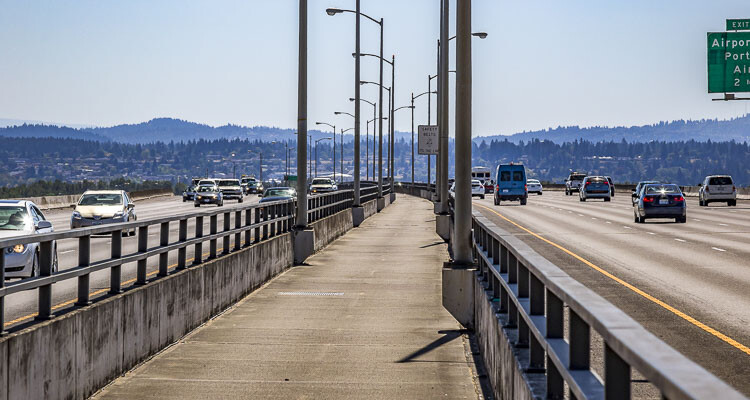
The action will have an obvious impact on the estimated 75,000 Clark County residents who commute to work in Oregon
SALEM, Ore – After months of advocacy, legislative Democrats representing the Clackamas County area scored a major victory for regional communities facing the impacts of tolling on I-205. The action will have an obvious impact on the estimated 75,000 Clark County residents who commute to work in Oregon.
In a letter Tuesday (May 2), the Speaker of the House, the Senate President, and the Co-Chairs of the Joint Transportation Committee have announced the creation of a Special Subcommittee on Transportation Planning to oversee and monitor the Oregon Department of Transportation’s (ODOT) plans to mitigate the negative impacts of tolling on vulnerable communities. In order to make sure that any tolling program is carefully considered and incorporates the feedback from impacted communities, Governor Kotek is responding to the calls of the legislators and pausing all toll collections until January 2026.
“I know firsthand that our communities have not felt heard by ODOT, and that they feel their deep concerns were being ignored by the agency,” says Rep. Annessa Hartman (D-Gladstone), who has been appointed to serve on the newly formed Special Subcommittee on Transportation Planning. “Since being sworn into the legislature, I’ve advocated fiercely in the Capitol for our voices to be heard and for ODOT to pause, listen to our constituents and get this right. There is a lot of trust that needs to be rebuilt and I am proud to serve on this committee to give our districts a seat at the table.”
The Subcommittee will meet through the interim to oversee ODOT’s plans to ensure safety, mitigate congestion, support our economy, reduce pollution, and ensure that the needs of local communities are being heard and incorporated into planning.
“Families and local leaders in our communities have been justifiably frustrated with ODOT’s behavior,” says Rep. Jules Walters (D-West Linn). “This committee will give a voice to those frustrations, and the pause will give us time to ensure the agency hears them.”
“Our communities should not disproportionately shoulder the cost of interstate infrastructure. A flawed tolling program would harm working families, individuals on fixed incomes, and businesses in my community. I don’t believe a toll should divide someone from their own town.” said Rep. Courtney Neron (D-Wilsonville) “We have an obligation to ensure community voices are heard, legislative sideboards are in place, and that ODOT cannot proceed without truly taking our needs into consideration.”
Last week, Reps. Hartman, Walters, and Neron introduced HB 3614, which would pause tolling until January 2026 and establish a committee to oversee ODOT’s tolling program. The bill was co-sponsored by a bipartisan, bicameral group of 31 legislators.
“Today, we are grateful that our voices are finally being heard loud and clear,” said Rep. Annessa Hartman (D-Gladstone).
Clark County opposition to Oregon’s tolling plans
In April, Members of the Clark County Council approved a resolution in opposition to tolling the I-5 Bridge replacement and the I-5 and I-205 corridors in the Portland Metropolitan area. Councilors Karen Dill Bowerman, Gary Medvigy and Michelle Belkot voted in favor of the resolution and Councilors Glen Yung and Sue Marshall voted against it.
A “white paper’’ was produced on April 11 detailing the County Council’s response to the Oregon Department of Transportation and Federal Highway Administration’s invitation for tolling feedback, the deadline of which was April 21. The “white paper’’ served as an outline and starting point for the County Council’s discussion regarding the updated resolution in opposition to the tolling proposal that will have an impact on the Clark County residents who commute to Oregon for work.
The April 11 paper stated that “the tolling system places unreasonable burden on Washington residents, particularly low income residents, who cannot modify their work schedule and overall who can least afford the toll.’’ It also stated that the council will continue to follow in the footsteps of the Board of Councilors’ Resolution from 12-23-2015 when it adopted “a policy of opposing every Light Rail project in Clark County unless it is first supported by a majority of the voters in a countywide advisory vote of the people.”
Members of the Vancouver City Council have also expressed concerns over Oregon’s tolling proposal.
Also read:
- Opinion: Hiding the growing cost of the Interstate Bridge replacementJoe Cortright of the City Observatory addresses the rising cost of the Interstate 5 Bridge replacement project.
- 90 minutes of delay on Southbound I-5 in Southwest Washington on Friday afternoon, July 26Travelers using southbound Interstate 5 through Woodland should expect up to 90 minutes of delay during Friday afternoon and evening and should delay travel or prepare for additional travel time.
- Nighttime paving work on I-5 and SR 14 in Clark County July 28-Aug. 9Nighttime travelers in Clark County should expect delays for maintenance and paving work beginning Sunday, July 28 until the morning of Friday, Aug. 9.
- Northeast 182nd Avenue/Northeast Ward Road to be closed on Aug. 1Northeast 182nd Avenue and Northeast 172nd Avenue in Clark County will have single-day closures on August 1 and August 5 for road preservation, with detours in place.
- Interstate Bridge Replacement program awarded $1.499 billion FHWA Bridge Investment Program grantInterstate Bridge Replacement program officials have shared that the program received $1.499 billion through the Federal Highway Administration’s Bridge Investment Program.









